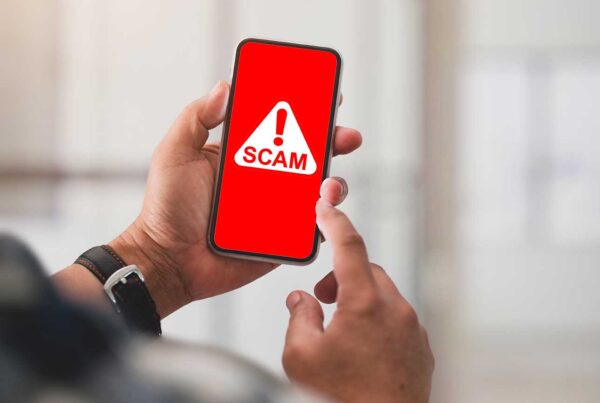In observance of World Elder Abuse Awareness Day in June, we want to shine a light on fraud prevention for seniors and the importance of understanding red flags as a first line of defense. Prevention begins with your ability to spot scams.
Look for any of these scam red flags and act accordingly:
- Be skeptical of unsolicited communications.
Scammers will contact you out of the blue and pose as individuals or businesses you know and trust. It’s how they get you to let your guard down right off the bat. - Be skeptical when you feel your emotions spike.
Scammers will inform you about a problem to solve such as an unpaid bill or the potential loss of service (which preys on your emotions of anxiety and fear) or a prize you won (which preys on your emotions of elation and relief). The more emotional you are, the less likely you are to slow down and think clearly. If you think it’s too bad or too good to be true, you’re probably right. - Be skeptical of urgency.
Scammers will push you to resolve the issue or claim your prize immediately. This is a classic combo: They manipulate your emotions and get you to act quickly without thinking. - Be skeptical when asked to send money or share personal/financial information.
Here are four current approaches scammers use to target seniors:
- Government Impersonator:
Here’s how it works: Someone claiming to be from a government agency reaches out to you unsolicited. Maybe they say they need to update your account information before they can issue your new medical card. Maybe they claim they need to verify your account number before delivering free equipment or services. Or maybe it’s a robocall that says there has been an error in processing, and you need to contact them immediately or face hefty fines. - Fake Prize:
You answer the phone or open an email and—great news!—it claims you’ve won a sweepstakes or lottery. To claim your prize, you need to share your credit card number or other account information. If you are reluctant, they’ll crank up the urgency by saying this is your one chance to claim your prize. - Computer Tech Support:
A scammer reaches out to notify you that your anti-virus software renewed for $500. They offer a refund, and you say, “Yes, send it!” You receive an email with the receipt, followed shortly thereafter by yet another email from the scammer: “We’ve overpaid the refund”—instead of refunding you $500, they’ve refunded you $5,000. They then instruct you on how to send the $5,000 back so they can correct it. And suddenly you’re out $5,000. - Family Emergency:
You get a phone call or a text from a supposed panicked member of your family who is in trouble. Maybe they’ve been hospitalized, arrested, or are in some other sort of predicament. They can’t get out of it unless you send them money right away. It’s worth noting that the Federal Trade Commission published an alert that said scammers have started using artificial intelligence to clone voices they find online (from public social media pages, for example). What does that mean? That familiar voice at the end of an urgent phone call might not actually be your family member; it could be a scammer using voice impersonation.
Here’s what to do when you spot a red flag:
- Resist the urge to act immediately.
No matter how urgent or insistent the delivery, slow down and take time to think about the best course of action to take next. - Never share personally identifiable information with someone who has contacted you unsolicited.
Whether it’s over the phone, by email, or on social media, don’t share your information. This includes bank account numbers, online banking passwords, credit card information, your birthdate, your Social Security or Social Insurance number, your health insurance number, etc. None of it. - Take charge.
Instead of being on the receiving end of an unsolicited call, hang up and call the company directly using an established channel that you already know and trust. - When in doubt, reach out to a Verve fraud specialist for assistance.
Here’s how Verve can help:
If you think your Verve account is at risk because of any scam, call Verve at 800.448.9228. One of our team members can look at your account with you to verify there are no suspicious transactions, help you cancel your card if you’ve entered your number into a questionable website, and help you safeguard your account against fraud.
Verve aims to provide education, training, and information to help our members stay financially fit. We are committed to keeping our members educated about their finances by providing details on financial risks and ways to stay safe.
Want to learn more? Check out these additional resources.





 Federally Insured by NCUA |
Federally Insured by NCUA |  Equal Housing Opportunity |
Equal Housing Opportunity |